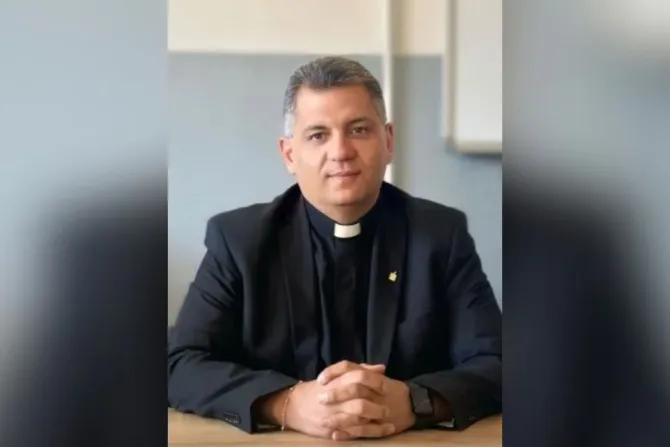On the afternoon of September 17, Father Marwan Ghanem, who leads the Nusroto Al-Anashid Charity Association and the Brotherhood of Prisons in Lebanon, was making his way to a medical appointment in Beirut.
Little did he know, the day would take a shocking turn as he witnessed a series of devastating explosions that shook the country.
A Scene of Chaos
In a heartfelt interview with ACI Mena, Ghanem recounted the terrifying moments he experienced.
While driving through the Ghobeiry district, he paused to ask a motorcyclist for directions when he heard a faint pop.
Suddenly, the motorcyclist collapsed onto his car, bleeding heavily from a stomach wound.
In that moment, Ghanem’s shirt was stained with blood, a grim sign of the chaos unfolding around him.
Just moments later, another motorcycle crashed into the back of his car, sending the injured rider tumbling to the ground.
Ghanem was taken aback; he hadn’t heard any airstrikes or shelling prior to this.
All he could see were people collapsing around him, lying in pools of blood.
It quickly became clear that a series of pager explosions, linked to Hezbollah members, had just occurred.
A Call to Action
Wearing his black clerical robe, Ghanem immediately sprang into action, helping three injured individuals into nearby cars bound for hospitals.
Continuing his journey, he was struck by the sight of dozens of people heading toward Sahel Hospital in Ghobeiry, many suffering from severe injuries to their stomachs, hands, faces, and eyes.
The panic caused another vehicle to collide with the back of his car, shattering the rear and rear-left windows.
To Ghanem, the scene resembled a river of blood, highlighting the gravity of the situation.
Seeing Humanity Beyond Labels
Reflecting on his decision to assist the wounded, Ghanem shared that he didn’t consider whether the victims were Muslim or Christian. In that chaotic moment, he saw “the face of the wounded Christ on the road.”
He emphasized that in such dire circumstances, distinctions fade away; what truly matters is our shared humanity, created in the image of God.
He felt he had fulfilled God’s will by helping the injured.
Even if his contribution was small, he couldn’t bear the thought of leaving anyone to suffer alone.
For Ghanem, not helping was a sin, and as fear dissipated, courage took over, driving him to aid those in need.
A Miraculous Escape
After the chaos, Ghanem reflected on what God had in store for him, especially since he had escaped the explosions unscathed.
Interestingly, the doctor he was visiting had a pager in his office that exploded, yet he remained unharmed, being in another room with Ghanem.
Tragically, someone in an adjacent office was not so lucky and lost their life.
Ghanem couldn’t shake the feeling that had he been in the doctor’s office at that moment, he too would have been injured.
Grateful for the delay that saved him, he saw it as divine intervention, a sign that God wanted him to continue his important work in prisons and humanitarian efforts.
Ghanem expressed that all parties involved in the conflict were ultimately losers.
He urged the anxious Lebanese people to reconsider their relationship with God, emphasizing that He does not abandon anyone in their time of need.
The Cause of the Explosions
The explosions linked to Hezbollah’s pagers resulted in 12 fatalities and nearly 2,800 injuries, as reported by the Lebanese acting health minister, Firas Abiad.
Two theories emerged regarding the cause of these explosions: one posits that Israel had booby-trapped the pagers before their importation, while the other suggests issues related to wave interference and battery overheating.
The following day, walkie-talkies belonging to Hezbollah members also exploded across Lebanon, adding to the chaos and confusion in the aftermath of the initial incidents.
